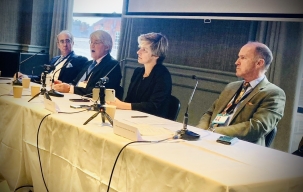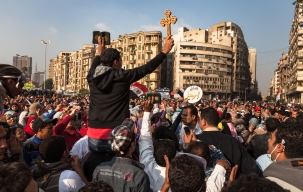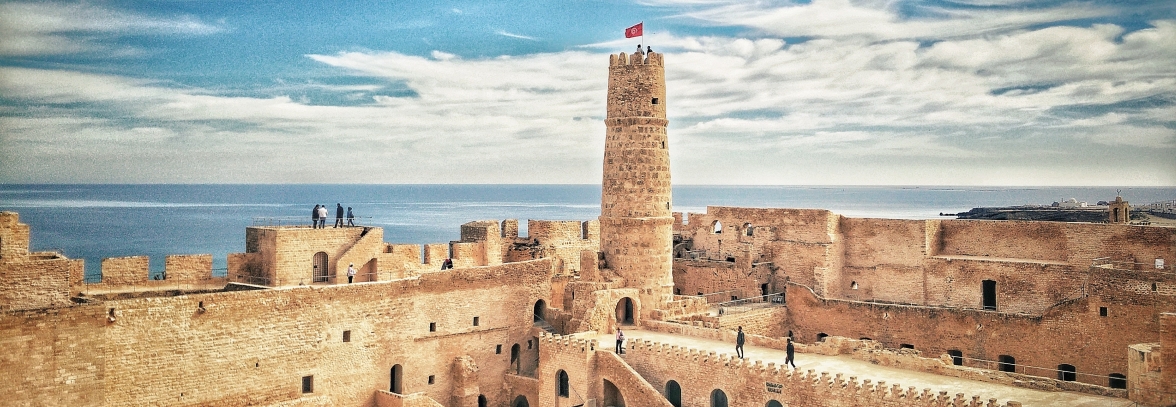Key dates
Latest
-
PodcastsDefence & Security — 2 Oct 2024
Podcast: CMEC at CPC24 pt.2: Does 'Stop The Boats' start in the Sahel?

-

-


Tunis
11.5 million
Presidential rule by emergency decree; parliament suspended
President Kais Saied
Prime Minister Mrs Najla Bouden
March 20th
H.E Mr Yassine El Oued (Officially appointed by President Kais Saied on August 5th, 2023)
Embassy of Tunisia, 29 Prince’s Gate, London, SW7 1QG
H.E Mr Roderick Drummond (formerly UK ambassador to Bahrain) (Replaced Helen Winterton November 2024)
British Embassy Tunis, Rue du Lac Windermere, Les Berges du Lac, Tunis, 1053, Tunisia
Population
The population of Tunisia is an estimated 11,700,000 people. The ethnic breakdown is Arab 98%, European 1%, and other 1%. The official language is Arabic. Berber languages are also spoken. French, although not an official language, continues to play a major role in business, the media, and across the education system. It is spoken by roughly two-thirds of the population.
The median age in Tunisia is 32.7 years and the population is growing at a rate of 0.85%. Life expectancy is 76.3 years. The literacy rate is 81.8% while the unemployment rate stands at 15.4%.
Government
Tunisia is a representative democracy comprising of an executive president, a legislature and judiciary. The executive branch is made up of the president (as head of state) the prime minister (as head of government) and the cabinet. Legislative authority is held by a single chamber, the Assembly of the People’s Representatives. This chamber has 217 seats, 199 of which are directly elected in Tunisian multi-seat constituencies and 18 in multi-seat constituencies abroad by party-list proportional representation vote. Members serve 5-year terms.
The judiciary is divided into four branches: the ordinary judiciary headed by a Supreme Court, the administrative judiciary, the financial judiciary, and the Constitutional Court.
History
Due to its strategic location in the centre of North Africa, close to vital shipping routes, Tunisia has been an important player in the Mediterranean throughout history.
Tunisia gained independence from France on 20 March 1956 and one year later the country proclaimed itself a republic, with Habib Bourguiba its first president. Bourguiba remained president until November 1987 when doctors declared him unfit to rule and he was replaced in a bloodless palace coup by his prime minister, Zine El Abidine Ben Ali. To rub salt into the wounds, Ben Ali declared November 7th, the day of Bourguiba's fall, a national holiday. Bourguiba died aged 96 in 2000.
Tunisia - cradle of "The Arab Spring"
Ben Ali’s regime was overthrown in January 2011 as part of the so-called Arab Spring.
Youth unemployment and regional marginalisation were probably the two greatest causes of the revolution of 2010/2011 which led to Ben Ali's overthrow. Ben Ali's economic policies were centred on increasing the number of university graduates for the private sector, as well as the all-important Association Agreement signed with the European Union. His policies helped decimate the country's textile sector and increased the jobless total by approximately half a million. Youth unemployment stood at around 31%.
Mohamed Bouazizi and Sidi Bouzid
The catalyst for the revolution was the self immolation of 26 year old street vendor Mohamed Bouazizi in the town of Sidi Bouzid in the heart of Tunisia on December 17th 2010. The town was typical of marginalised communities in Tunisia and had been the scene -a few months previously - of a protest by small scale farmers, denouncing attempts by a bank to expropriate their land. Bouazizi himself had suffered repeated humiliations at the hands of local authorities which had confiscated his wares.
Bouazizi's shocking act sparked protests in Sidi Bouazizi and soon spread throughout the country. On January 14th 2011, in the face of strikes and mass public street demonstrations, Ben Ali fled and his family into exile to Saudi Arabia. Bouazizi died of his injuries on January 4th 2011.
A new constitution and a difficult re-birth
The first post-Ben Ali elections were held on October 23rd 2011, and were declared free and fair by international observers. In fact, they were the first free elections since 1956. The Islamist Ennahda, Movement Party inspired by the Muslim Brotherhood, emerged as the biggest winner, gaining 89 of the 217 seats in the Constituent Assembly.
It was triumph for Ennahda, which had been banned by Ben Ali. The party reinforced the secular nature of the state by declaring that it would not use Sharia Law as the basis for legislation, a decision that drew criticism from more hard line Islamists. In 2014, Tunisia approved a new constitution which resulted in the organisation of successful parliamentary and presidential elections. The same year saw the creation by interim president Moncef Marzouki of the Truth and Dignity Commission aimed at national reconciliation.
President Kais Saied and Ennahda political crisis
Tunisia's first democratically elected president, Beji Caid Essebsi, died in July 2019, a few months before the end of his first term. He was succeeded as president by law professor Kais Saied in a land-slide election in October 2019.
In July 2021, Tunisia witnessed wide-scale protests against Ennahda over grievances combining government dysfunction, particularly in response to the COVID-19 pandemic, and corruption. On July 25th 2021, President Saied suspended parliament and dismissed prime minister Hichem Mechichi.
President Saied also withdrew immunity from members of parliament. He would later institute an investigation into the foreign funding of members, particularly those representing Ennahda. In January 2022, senior Ennahda politicians were among 19 high-ranking officials to be referred by the Tunisian judiciary to court for "electoral violations" allegedly committed during the 2019 presidential elections.
Constitutional reform 2021
In September 2021, President Saied appointed a committee to amend the constitution, and a month later appointed a cabinet. On September 29th 2021, he appointed as prime minister the geologist and engineering professor Najla Bouden, the first woman to be appointed to head a government both in Tunisia and the Arab world.
In December 2021, President Saied announced a constitutional referendum for July 25th, and parliamentary elections at the end of 2022.
Religion
Islam is the official religion in Tunisia, and around 98% of the country’s inhabitants describe themselves as Sunni Muslim. There are also small Christian, Jewish, and Baha’i communities.
Economy
The currency in Tunisia is the Tunisian Dinar (TND). In the most part, its economy remains dominated by a handful of sectors, namely mineral exports, including petroleum and phosphates, manufacturing, particularly textiles and clothes and agriculture. Its main agricultural commodities include citrus fruits, olive oil, tomatoes, dates, and almonds, with the sector accounting for roughly 10% of GDP. Tourism has also provided a significant source of revenue, however a string of terrorist attacks in recent years have hit the sector hard.
Exports are a key part of the economy and Tunisia relies heavily on trade with Europe, especially France, Italy and Germany. Indeed, 80% of its exports are to the European Union.
Regional disparities between the more fertile and economically developed north and the arid central and southern regions, high unemployment and corruption have beset Tunisia’s economy in the past. As a result, the Tunisian Government is seeking increased foreign investment and is working with the IMF through an Extended Fund Facility agreement to fix fiscal deficiencies.


